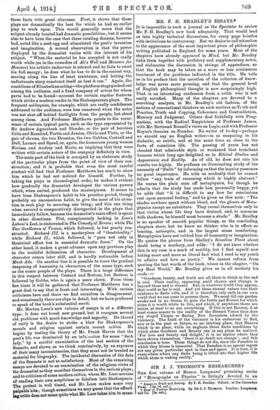MR. F. H. BRADLEY'S ESSAYS.*
Im is impossible in such a journal as the Spectator to review Mr. F. H. Bradley's new book adequately. That would lead us into highly technical discussions, for every page bristles with invitations to controversy. But we desire to call attention to the appearance of the most important piece of philosophic writing published in England for some years. Moat of the chapters have already appeared in Mind, but Mr. Bradley links them together with prefatory and supplementary notes, and elaborates the discussion in strings of appendices, so that the book may be taken as a more or less continuous treatment of the problems indicated in the title. He tells us in his preface that the question of the criterion of know. ledge was never more pressing, and that the general level of English philosophical thought is now surprisingly high. That is an interesting confession from a critic who is not easily satisfied. Many of the chapters are devoted to a searching analysis, in Mr. Bradley's old fashion, of the notions of conventional thinkers on such matters as Truth and Practice, Truth and Copying, Coherence and Contradiction, Memory and Judgment. Others deal faithfully with Prag- matism, with the Radical Empiricism of Professor James, with Mr. Bertrand Russell's views on Logic, and with Professor Royce's theories on Number. No writer of to-day—perhaps we should say no English writer—is so unsparing in his dialectic, so subtle, and at the same time so close to the facts of conscious life. The passing of years has not clouded that admirable style or weakened that trenchant humour which long ago delighted us in Ethical Studies and Appearance and Reality. As of old, he does not rate his results too highly. He prefaces an illuminating study of the necessity of "Faith" by informing us that the inquiry possesses no great importance. He tells us modestly that he cannot follow "any train of reasoning which ie highly abstract." He warns the plain man off metaphysics, for though he admits that the study has made him personally happy, yet he adds that "it is difficult to say how far conclusions rest upon personal feeling," and he gives us this note: "The shades nowhere speak without blood, and the ghosts of Meta- physics accept no substitute. They reveal themselves only to that victim whose life they have drained, and, to converse with shadows, he himself must become a shade." Mr. Bradley is no speaker of smooth popular things, as the concluding chapters show, but we know no thinker who is in effect so bracing, antiseptic, and in the largest sense comforting. Metaphysics have not robbed Lim of humanity or imagination. He quotes the phrase from Shelley's Sensitive Plant about death being a mockery, and adds : "I do not know whether this in my case is a mark of senility, but I find myself now taking more and more as literal fact what I used in my youth to admire and love as poetry." We cannot refrain from quoting the last words of the book, where in the chapter, " On my Real World," Mr. Bradley gives us in all modesty Lis credo Goodness, beauty, and truth are all there is which in the end is real. Their reality, appearing amid chance and change, is beyond these and is eternal. But, in whatever world they appear, that world so far is real. And yet these eternal values owe their existence to finite wills, and it is therefore only each in our on n world that we can come to possess them. We must till our garden awake and in no dream to gain the fruits and flowers for which alone it is worth while to live, and which, if anywhere there are better, at least to us are everything. If this is not Heaven, it at least comes nearer to the reality of the Blessed Vision than does any stupid Utopia or flaring New Jerusalem adored by the visionary. The fault of the visionary is his endeavour to find, now or in the past or future, as an existing place, that Heaven which is no place, while he neglects those finite conditions by which alone Goodness and Beauty can in any place be realized. 'For love and beauty and delight,' it is no matter where they have shown themselves, 'there is no death nor change ' ; and this conclusion is true. These things do not die, since the Paradise in which they bloom is immortal. That Paradise is no special region nor any given particular spot in time and space. It is here, it is everywhere where any finite being is lifted into that higher life which alone is waking reality."














































 Previous page
Previous page